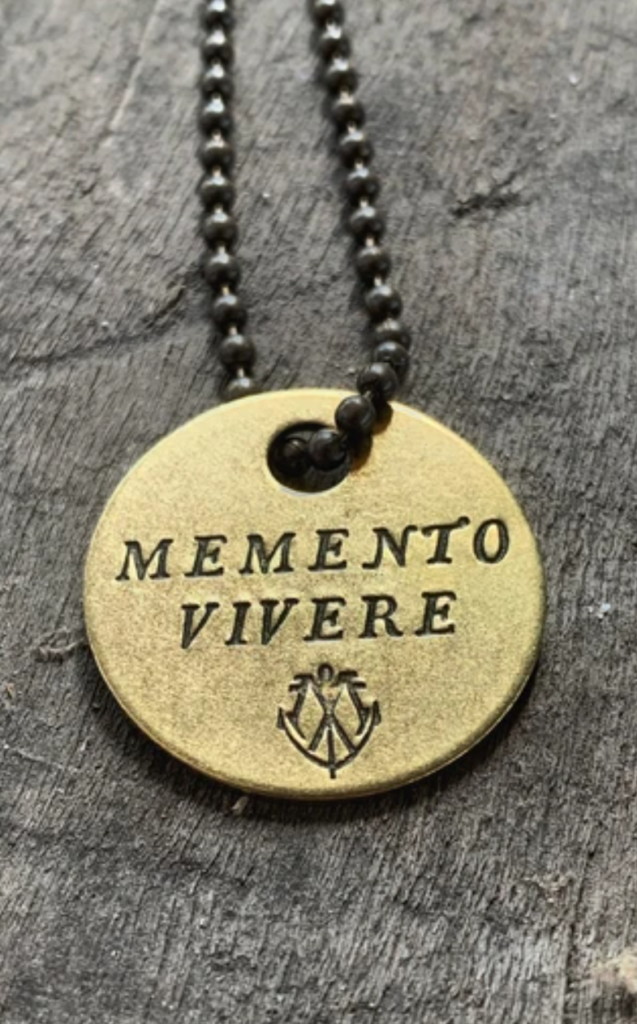Working with the Latin language every day makes for some interesting social media ads on my feed. A while back I was scrolling through my poorly-used Instagram account, and I ran across an ad for a medallion stamped with the phrase: Memento mori, “remember that you will die.”

That caught my interest. Not only because I like Latin phrases, which I do. But also because the Christian church has long urged believers to not only be aware of but to actively cultivate a healthy sense of one’s mortality. Long before that, the Hebrew Scriptures shatter our illusions of invincibility with this stark and often unwelcome fact:
“In the sweat of your face you shall eat bread till you return to the ground, for out of it you were taken; you are dust, and to dust you shall return.”
Genesis 3:19
This verse comes into the liturgy for Ash Wednesday: “Remember that you are dust, and to dust you shall return.” It’s a fact. We know it. It’s foolish for me to deny it. But why do I have to remember it? That sounds a bit morbid–literally.
I don’t know a great deal about art history, but it doesn’t take much to know that the image of a skull is a kind of memento mori, a warning against vanity. In older art, this motif is nearly ubiquitous and one that we today might find morbid simply because we live in a culture that denies and avoids the thought of death. I have always found the 1892 drawing, “All is Vanity,” by C. Allan Gilbert to be particularly effective.

Earlier generations thought about death intentionally. It was, in fact, a form of moral and spiritual discipline.

A common genre of writing was the Ars bene moriendi, the art of dying well. One of the Puritans I have studied, William Perkins, wrote such a book in 1595. It bore the prolix title: A Salve for a Sicke Man: or A Treatise Containing the Nature, Differences, and Kinds of Death: As also the Right Manner of Dying Well. The title page listed a few life-threatening occupations and situations: And it may serve for spirituall instruction to 1. Mariners when they goe to sea. 2. Souldiers when they goe to battell. 3. Women when they trauell of child. Seafaring and warfare are obviously dangerous. Travelling with children might seem to have its own perils; but here the word means to travail, that is, to be in labor with a child. Many women, of course, died in childbirth, as did many children.
And until modern times, death was much more in people’s faces. You couldn’t deny death when it was an exception for a couple not to have lost a child. When women regularly died giving birth. When the plague could sweep through a region and kill a large percentage of the population (which seems a timely bit of history to remember at this moment, as COVID-19 ravages).
Pastors like Perkins reminded their parishioners, and not only those who were sailors or soldiers or great with child, that they were mortal. They were going to die. And they should remember that every single day. Well, that sounds like a downer.

The other day, I was reminded of how utterly foreign this concept now appears. I was meandering through a little-known cemetery here in Grand Rapids. It’s on the grounds of what used to be the “poor farm,” a place for impoverished and even disabled persons a century ago. Residents were buried on the grounds at county expense. Years ago, I had heard stories of this hallowed ground, located behind the Lutheran nursing home. But the other day, I took my energetic corgi Blue on a walk, and we stumbled across the rows of minimalist headstones. I knew what it was right away. The simple markers were ordered in the simplest way, by dates of death, which spanned the years 1894 to 1907. Many more depressions in the earth betrayed unmarked graves. One slab marked the final resting place of a Civil War veteran. I posted a few pictures of the headstones from this walk, and a close relative asked me why in the world I would ever intentionally spend time in such a sad place. Why think about death on purpose?
Now, it’s true; one could be morose about this. One could morbidly focus on death. It’s possible to think only about death, only about impermanence, only about decline. One could live a whole life of mourning, reciting lines from Ecclesiastes about how nothing that gives us joy means a thing, in the end. Memento mori could sound like an invitation to a thoroughgoing pessimism, a worldview of nihilism, a personal attitude of melancholy, or even unremitting depression. But that’s not the point of memento mori. Quite the opposite in fact.
And that brings me back to jewelry ads on social media. Another item on that website (yes, I clicked) was a similar medallion, with a different Latin phrase: memento vivere.

This Latin phrase means: “Remember to live.” And this one also caught my attention, because it is the flip side of memento mori, properly understood. The spiritual guides who wrote treatises on dying well, for sailors and soldiers and expectant mothers and everyone else, were not calling people to a morose, morbid, melancholy existence. Rather, the way to die well is to spend your days living well. Live for something more enduring than things, than being in control, than being right. And if the gospel means anything, it means that death is not the end. It means that beauty and vigor and physical strength will all fade. Your wealth will pass to another. The key to living well, and thus dying well, is not to live for these transient things. Remember to live well. That’s the point of remembering that you will die.
And for some of us, just remembering to live is important. If you carry a heavy load of grief, for dear persons lost, or for dreams long buried. If your outlook on life tends to the melancholy, from depression, from past trauma and wounds imperfectly healed. In that case, do not only recall that you will die. Remember to live in the meantime. Receive the gifts of the day, and the gift that is the day. Give and receive love. Cherish people. Steward your life, and take care of your body, and relish God’s gorgeous creation.
Were I to try to put these two Latin phrases together, my best guess would be this: Memento mori ut memineris vivere. Remember that you will die, so that you will remember to live. 💀
